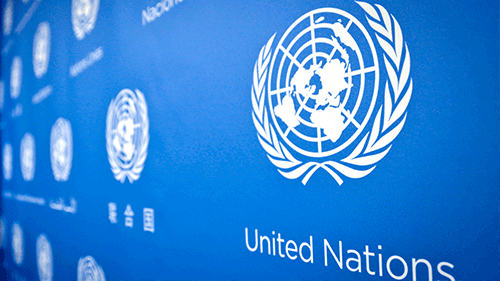

Dear Dr. Smith,
Later this year I will step down as Executive Director of the United Nations Global Compact. I wish to take this opportunity to thank you for the trust, time and effort you have extended to the Global Compact over the years.
After 15 years of growth and innovation, I look back with pride and ahead with confidence. What was intended as a policy speech by former Secretary-General Kofi Annan has grown into the world’s largest corporate sustainability initiative, with over 12,000 business and non-business signatories from more than 160 countries. Our philosophy of “shared responsibility for a better world” turned out to be not just a sensible proposal to business, but one that works. We have proven that when you engage business and all key players on issues of common importance, progress can be made.
I have no doubt that the Global Compact will continue to flourish as an initiative, and increasingly help you as a participant to better navigate today’s risks and opportunities, while at the same time producing greater social and environmental benefits. The Global Compact today has a solid foundation. It is welcomed by all Governments. Our unique public-private structure ensures that the best of both sides can be leveraged and that our voluntary character will be retained. Of course, your commitment to action and your financial support will continue to make this all possible.
In 2014 a number of developments stood out.
First, the business case is strong. What we have been preaching for 15 years is becoming mainstream thinking. Investors everywhere are finally realizing what enlightened business leaders have long known: financial success goes hand-in-hand with environmental stewardship, social responsibility and good governance (ESG). Our sister initiatives – the Principles for Responsible Investment (PRI), Principles for Responsible Management Education (PRME) and Sustainable Stock Exchanges (SSE) – are now powerful drivers for corporate uptake of responsible practices. For example, PRI now includes 1,200 investment institutions representing over US$45 trillion in assets under management. Each has committed to take their fiduciary responsibility seriously by integrating ESG issues into analysis and decision-making.
Second, our Local Networks have significantly stepped up their activities in all parts of the world, including Africa. Our 86 Local Networks are helping companies to fulfil their commitment to the Global Compact and to better understand what responsible business means within a national context. In the past year alone, over 600 activities were carried out through the networks – related to learning, networking, policy dialogue and partnerships.
Third, we have seen increased activity by business and other stakeholders in our issue platforms and programmes, allowing you to collaborate more and scale up good practices. Notable progress has been made in areas such as human rights, climate change, women’s empowerment, supply chain sustainability, anti-corruption, water stewardship and children’s rights. Our newly launched platforms on peace, food and agriculture, and rule of law have seen remarkable uptake. And our leadership initiative, Global Compact LEAD, is breaking new ground – for example, producing innovative approaches like the Board Programme and better connecting responsible business to the world of finance through ESG Investor Briefings.
Demand for corporate sustainability is bound to keep growing. It increasingly is viewed as essential for long-term corporate success. And at the same time, our world’s challenges – ranging from climate, water and food crises, to poverty, conflict and inequality – are in need of solutions that the private sector can deliver.
Looking at the world around us, we have every reason to redouble our efforts. The framework conditions that enable markets to grow are eroding at the global level, with multilateralism on the retreat. Nationalism, populism and extremism are on the rise in many places, and so is violence and corruption. With power fragmenting and wealth concentrating, the spectrum of discontinuities has significantly increased. These social and political trends are only compounded by climate change consequences.
These dark clouds directly affect the ability of business to grow and prosper, and I believe that alarm bells should be going off in board rooms around the world. We are facing a serious threat to the foundation of global interdependence, open trade and rules-based commerce that, in recent decades, has driven growth and spread benefits and efficiency on a scale never seen before in human history.
The good news is that 2015 presents a unique opportunity to change course, as world leaders aim to adopt a new global sustainable development agenda – with related goals and targets, known as the SDGs – and also reach a global agreement on climate change.
This cannot be done without your help.
Internationalism is too important and complex to rest only in the hands of politicians. Moving forward, corporate leaders must be more cognizant of their pivotal role in the global marketplace – showing the power of responsible business to restore trust and help build markets that deliver a more sustainable future. This is our best hope to drive the profound changes the world needs.
Your commitment to the Global Compact is a critical step, and a sign to Governments and the world that business wants to be part of the solution. I therefore ask you to:
- Live the Global Compact principles. Drive good practices deeper into your organization and your supply chains, and then report your progress. This means, for example, embracing low-carbon solutions, celebrating diversity at the workplace, shining through transparency, and paying your fair share of taxes. Your ethical example will not just benefit workers and communities, but also come back to the advantage of the corporation broadly.
- Collaborate more. On systemic challenges, like corruption, climate or discrimination, look beyond first-mover approaches. Embrace partnerships and collective action efforts with peers and other stakeholders that pool resources, share risks and aim to find solutions faster. You can find opportunities through our Local Networks, our numerous issue initiatives, and our Business Partnership Hub.
- Become a corporate statesman. Speak up on issues of public concern and help shape policies that support solutions. This means aligning your public policy engagement with sustainability principles. When working through trade associations, urge them to leave behind old ideologies and embrace the future, moving from a defensive stance to one defined by proactive, pragmatic leadership.
- Be an ambassador for change. Too many companies are sitting on the fence or cutting corners. We need to win them over. The Global Compact can only deliver on its mission if a critical mass of companies is embracing universal principles. A tipping point is within sight, but we are not yet there. I ask you to help by recruiting peers and competitors through your supply chains and your associations.
More information on each of these areas can be found in our newly released Guide to Corporate Sustainability which lays out how business can move forward on sustainability and what the Global Compact is doing to help.
This year the Global Compact marks its 15th anniversary. We have come a long way from our launch in 2000 when 40 companies and civil society groups came to the United Nations, willing to test the idea that doing good business would be good for both business and the world. Today we are a truly global movement. And, while there is much work still to be done to achieve inclusive and sustainable markets, I am proud to say that the Global Compact’s blueprint for change has been tested and works.
In my time as Executive Director I have met so many wonderful entrepreneurs around the world, and want to thank you all for your courage and dedication. The Global Compact at its core is about knowing what is “right” and what is “wrong”. Our initiative stands strong thanks to your personal commitment.
I wish you every success for 2015 and beyond.
Yours sincerely,

Georg KellExecutive Director
UN Global Compact
